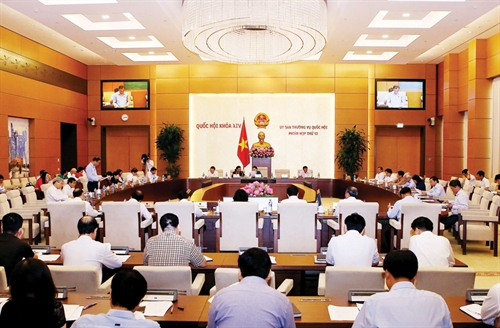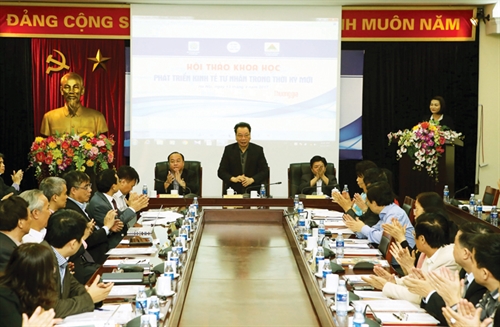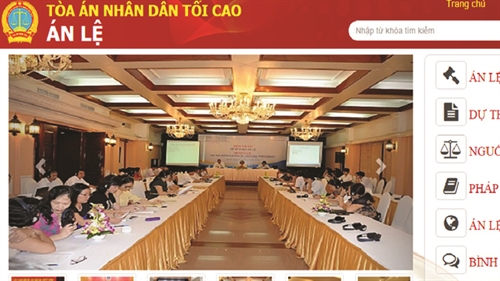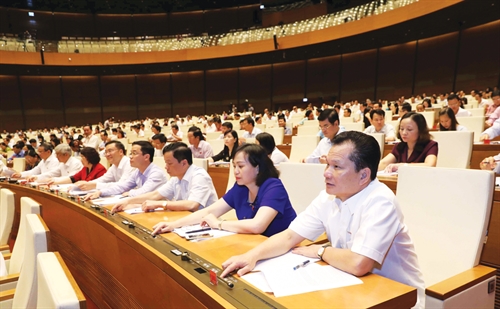Nguyen Hong Hai
Deputy General-Director
Department of Civil-Economic Laws, Ministry of Justice
Freedom of contract in general or free will to enter into contract in particular is one of the basic principles of private law and civil code. Vietnam’s 2015 Civil Code (the Code) contains necessary revisions to better guarantee these principles in the country’s private law system and in the formation and perfection of legal behavioral standards for subjects of private relations[1] in conformity with international customs and practices.[2]
General legal standards of freedom of contract
Free will is one of typical signs of private relations (in terms of both identification and legal nature of these relations) recognized by the Code, which are equality, free will, independence in property, and self-responsibility.[3] The Code’s core provisions concretize these legal features, including the free will of the subjects.
Free will is acknowledged to be a basic principle of civil law.[4] To ensure the enforceability of this principle, the Code no longer upholds “law observance” as a basic principle as stated in the 2005 Civil Code[5]. At the same time, it sets forth a principle that civil rights may only be limited by a law in case of necessity for the reasons of national defense, national security, social order and safety, social morality and community well-being.[6] This change is of paramount importance as it does not allow the court and judges to declare a contract null and void when the contracting parties have choices other than those prescribed by law.[7]
Natural persons and legal persons may exercise civil rights of their own free will on the basis of adhering to the basic principles of civil law and law-prescribed limitations on the exercise of civil rights, including limitations in freedom of contract.[8] Refraining from exercising civil rights does not constitute a basis for termination of these rights, unless otherwise prescribed by a law.
Specialized laws, when regulating private relations in specific fields, must not contravene the principle of free will; if they do, the civil code as a general law will prevail.[9] In case of absence of legal provisions, the court and judges must, first of all, base themselves on the parties’ agreement, then, in case there is no such agreement, on customary practices, analogous law, court precedents, fundamental principles and justice to settle a civil case or matter.[10]
The court and other competent bodies have the duty of respecting and protecting civil rights of natural persons and legal persons. The court may not decline to settle a civil case or matter for the reason that there is no applicable law. If finding a specific decision issued by a competent agency, organization or person violates the principle of free will, the court or another competent body may cancel it and restore the civil rights of the contracting parties.
The parties to a foreign-involved contract may agree to choose an applicable law;[11] in case there is no such agreement, the law of the country which is regarded as most associated with such contract will apply.[12]
 |
| Trungnam Group and Trungnam Wind Power sign an EPC contract to build Trung Nam windmill and a solar power plant in Ninh Thuan province_Photo: Duc Anh/VNA |
Legal status and capacity of contracting parties
Unlike the 2005 Civil Code, the Code stipulates that the subjects of private relations include natural persons and legal persons. For households, cooperative teams or other organizations that do not have legal person status, the Code does not deny their participation in transactions, given that such transactions are entered into by their members. The State of the Socialist Republic of Vietnam and its central and local bodies, when participating in transactions, have the legal status and capacity like non-commercial legal persons.[13] These revisions emphasize the legal signs of the subjects of private relations in general and of contracting parties in particular, namely: (i) being identifiable; (ii) being independent in terms of property upon participation in private relations: (iii) having procedural capacity; and (iv) having accountability capacity. This also makes Vietnam’s regulations on contracting conformable with international law.[14]
Regarding legal capacity, the Code stipulates that the civil law capacity in contractual relations of natural or legal persons may not be limited, unless otherwise prescribed by a law. However, in the establishment and performance of a specific contract, natural or legal persons must have legal capacity and civil act capacity suitable to such contract, specifically:[15]
For legal persons, their contract must suit the field in which they register their establishment or which is recognized by the State. Their civil law capacity with respect to contracts arises from the time they are established or their establishment is approved by a competent state body. For legal persons subject to operation registration, their civil law capacity will arise from the time they are registered. A legal person’s branches and representative offices are just dependent units, not legal persons. For contracts established and performed by branches or representative offices, the contracting parties are the legal persons that have established these branches or offices. If a legal person enters into and performs a contract as authorized by another individual or legal person, the contracting party is such individual or legal person.
For natural persons, adults are regarded as having full civil act capacity to establish and perform all types of contracts, unless they lose civil act capacity, have their civil act capacity restricted or have difficulty in cognition or act control[16] or fall into other cases where their rights are limited by a law.[17] Persons aged from 6 years to under full 15 years may enter into and perform contracts to meet their daily-life needs. Those aged from full 15 years to under full 18 years may enter into and perform contracts not related to immovable property or movable property subject to registration or not required by law to be consented to by their at-law representatives.[18]
Entry into contracts via representatives
Natural persons may enter into contracts either by themselves or via their representatives, unless it is required by law that they themselves enter into contracts or do so via their representatives.[19]
Meanwhile, legal persons must enter into contracts via their representatives. One legal person may have more than one at-law representative, who may be a person appointed by the legal person according to its charter, a competent person as prescribed by law, or a person appointed by the court during legal proceedings.
A representative may enter in the name of the represented person into a contract within the time limit and scope of representation. If this time limit is not specified while the right to representation is determined under a specific contract, the time limit of representation will expire when such contract terminates. If the right to representation is not determined under a specific contract, the time limit of representation will be one year from the time the right to representation arises. A contract entered into by the representative within the scope of representation will give rise to contractual rights and obligations of the represented person. The representative may perform necessary acts to achieve the purpose of representation in the course of entering into a contract.
A contract entered into by a person without the right to representation will not give rise to contractual rights and obligations of the represented person, unless the contract is recognized by the represented person, is known to but not opposed by the represented person within a reasonable time limit, or it is due to the represented person’s fault that the other contracting party does not know or is unable to know that the contract is entered into by a person without the right to representation.
The right to freely select contracting parties and agree on contract forms and terms
Both natural persons and legal persons are free to select partners for entering into contracts and offer the contract to specified subjects or the public. Regarding contract forms, unless it is not specified by a law,[20] the contracting parties are free to decide whether a contract is made orally or in writing[21] or through a specific act.[22] At the same time, the parties may freely agree on the contract terms and choose necessary contents to be included in the contracts, except the limitations of rights prescribed by a law.[23] These rights are very important as they not only create a legal corridor for the subjects to seek and access the market but also ensure the effective identification of appropriate partners.
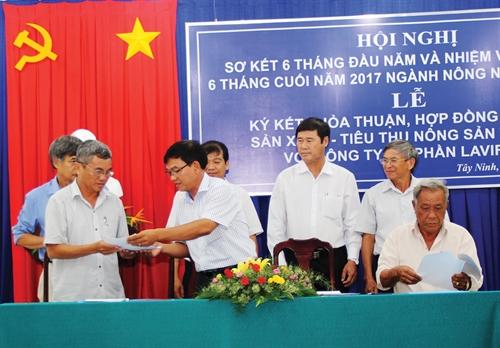 |
| Long An province’s Lavifood JSC signs a contract to purchase fruits from farmers in Tay Ninh province__Photo: Le Duc Hoanh/VNA |
The right to freely select ways of negotiation
The Code acknowledges that the contracting parties may freely choose ways of negotiating the contract, which may be based on negotiation or a model contract or general transaction conditions. However, this freedom, albeit very necessary, is not absolute; must comply with law and ensure legal safety for the parties.[24]
The party that offers the entry into a contract is binding on its offer to the offered party. If the offer includes a deadline for reply but the offering party enters into a contract with a third party before the party receiving the offer replies, the offering party will be regarded as infringing upon its obligation and obliged to compensate for damage (if any) to the party receiving the offer because it cannot enter into the contract.
Contract negotiation must be based on the principles of equality, goodwill and honesty.
Specifically, the parties are obliged to provide information to each other. If either party has information affecting the other party’s acceptance of the offer to enter into a contract, it must inform the latter. If either party receives the other party’s secret information in the course of contract negotiation and entry, it must keep such information confidential and may not use it for its own purpose or for another illegal purpose.[25]
The offering party may cancel its offer only when this right of cancellation has been stated in the offer and the offered party receives a notice of such cancellation before it sends a notice of acceptance of the offer.
If the signed contract is based on a model contract or general transaction conditions, such model contract must be made available to the offered party and ensure equality between the parties. If it contains provisions on exclusion of liability of the party that provides the model contract and increase of the liability or elimination of legitimate interests of the other party, these provisions will be null and void, unless otherwise agreed upon.
Free will to enter into contract and time of entry
Concerning acceptance of an offer to enter into a contract,[26] to respect the will of the parties and their transactions, the Code states that silence (non-action) can be regarded as acceptance of an offer if it is so agreed by the parties or this is a habit of the parties in the entry into contract.[27] The time limit for acceptance of an offer will be fixed by the offering party. In the absence of such time limit, the reply of acceptance will be valid only if it is made within a reasonable period of time.
If, after the offered party accepts an offer to enter into a contract, the offering party or offered party dies, loses civil act capacity or faces a difficulty in cognition or act control, the offer and the acceptance of the offer will remain valid, unless the entry into contract requires in-person certification by the offering party or offered party.
Regarding the time of entry into contract,[28] the Code stipulates that a contract may be entered into at the time the offering party receives the acceptance of the offer. If the parties agree that silence within a specified time limit means acceptance of the offer, the time of entry into the contract is the final point of time of such time limit. The time of signing a written contract is the time the final party signs the written contract or another written form of acceptance of the offer.[29] The time of entry into a verbal contract is the time the parties have reached agreement on the contract terms; if a contract is entered into verbally and then made in writing, the time of entry into such contract will be the time the parties have reached agreement on the contract terms.
Unless otherwise prescribed by a law, the parties may agree on the effective time of a contract; without such agreement, the contract will become effective on the time it is entered into. From the effective time of the contract, the parties must exercise the rights and perform the obligations toward each other as committed. The contract may only be modified or cancelled as agreed upon by the parties or prescribed by law (for instance, the Code’s Article 420 contains a new provision on contract performance when there arises a substantial change of circumstances, which says that at the request of either or both of the contracting parties, the court may modify the contract to suit the change).
Entry into contract without abiding by the principle of free will
The Code requires the parties to enter into a contract on a totally voluntary basis; otherwise, the signed contract will, in principle, be invalid.[30] However, on the basis of respecting the will of the subjects and their practical transactions and to ensure stability of relations and prevent the arbitrary declaration of contracts to be null and void, the Code lists six cases where contracts remain valid although the principle of voluntariness is not ensured:
(i) Contracts made by persons under full 6 years old or persons having lost their civil act capacity to meet their essential daily-life needs;
(ii) Contracts that only give rise to the rights or only exempt the obligations for minors, persons having lost their civil act capacity, persons having difficulty in cognition or act control, or persons having their civil act capacity restricted, and to their contracting partners;
(iii) Contracts whose validity is recognized by the contracting parties after they become adults or after they have their civil act capacity restored;
(iv) Contracts entered into by mistake but the parties have achieved the purpose of contract entry or are able to promptly rectify the mistake, ensuring the achievement of the purpose of the contract entry;
(v) Contracts entered into as a result of either party being cheated, threatened or forced, but recognized and performed by this party without requesting the court to declare the contracts null and void; and,
(vi) Contracts entered into at a time when the contracting parties with civil act capacity cannot perceive and control their acts but voluntarily recognize and perform the contracts without requesting the court to declare the contracts null and void.-


